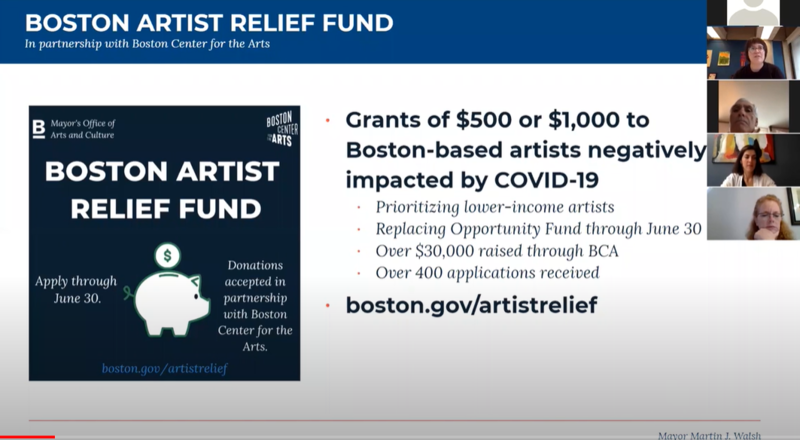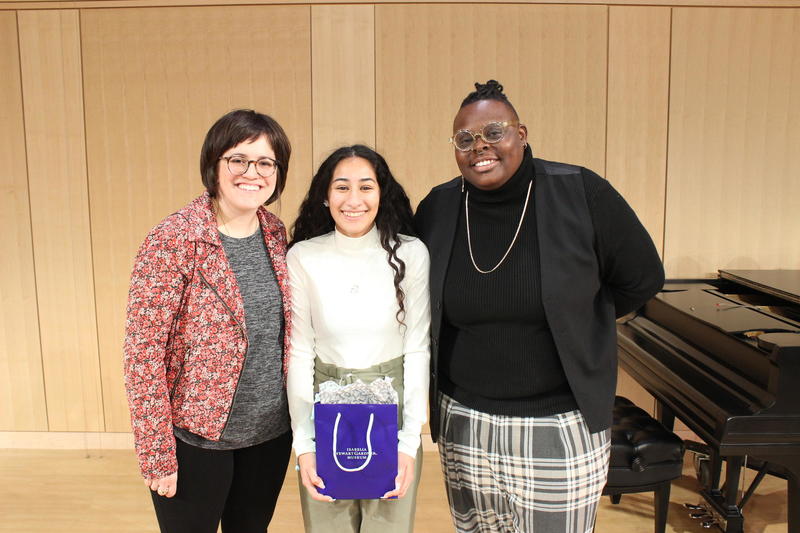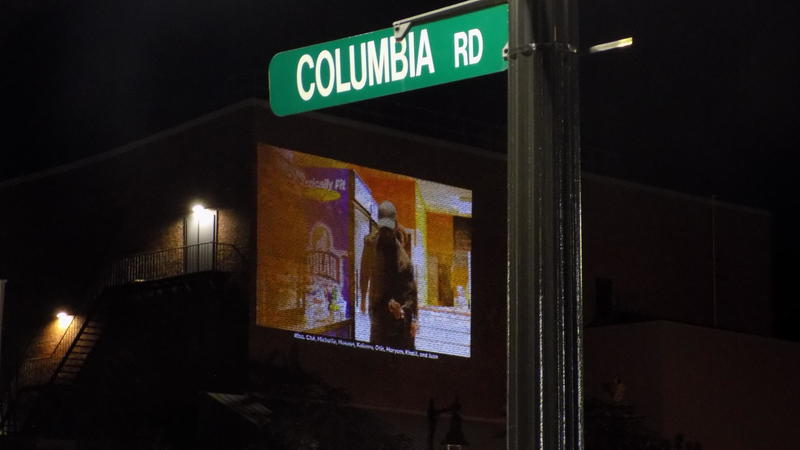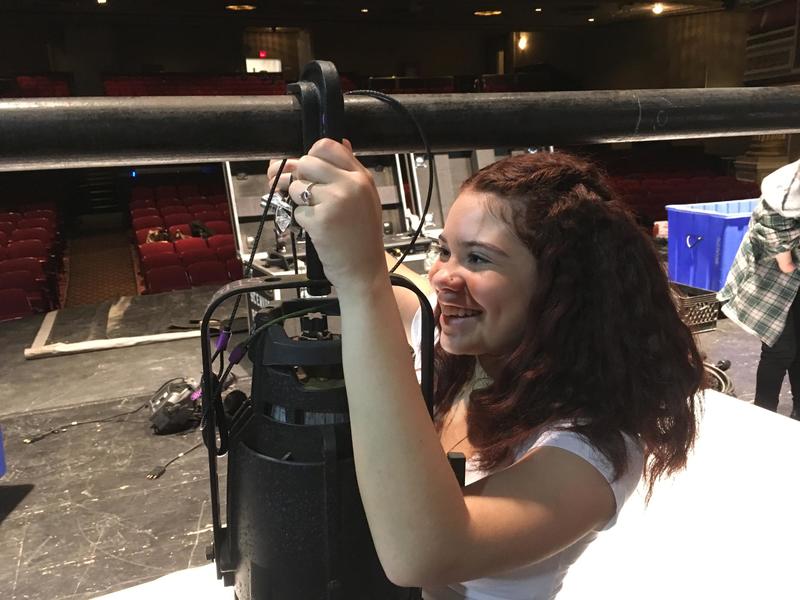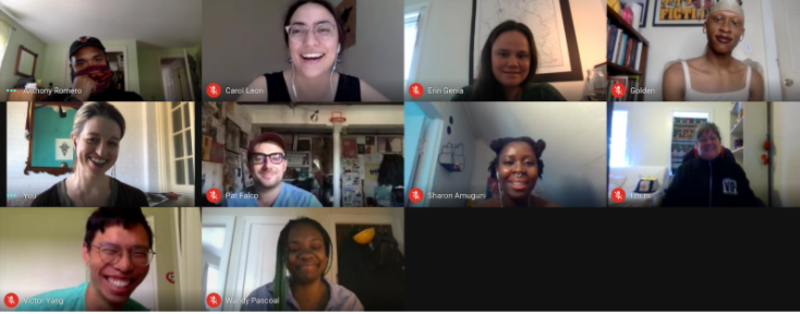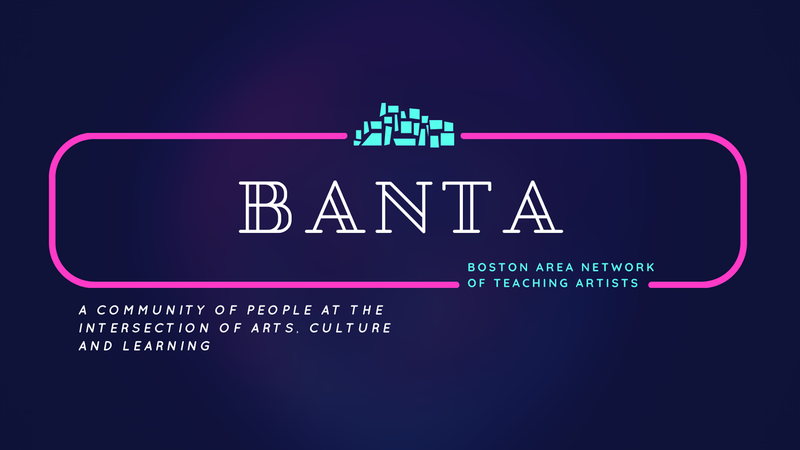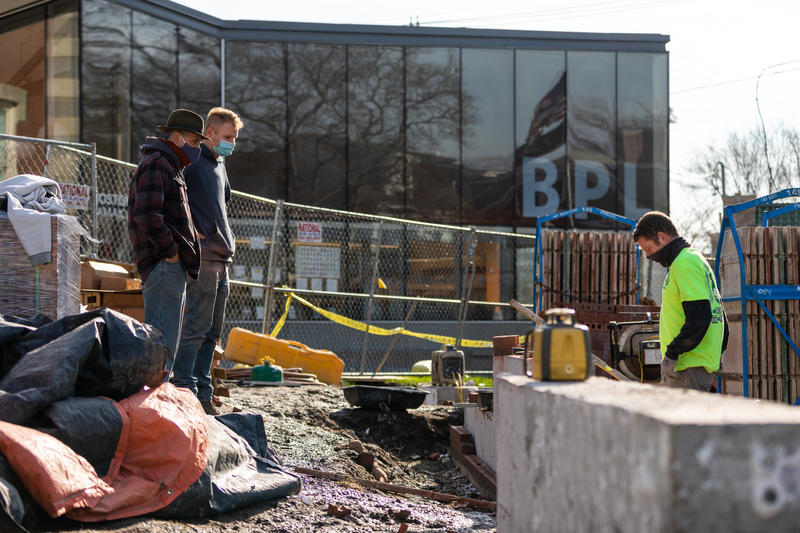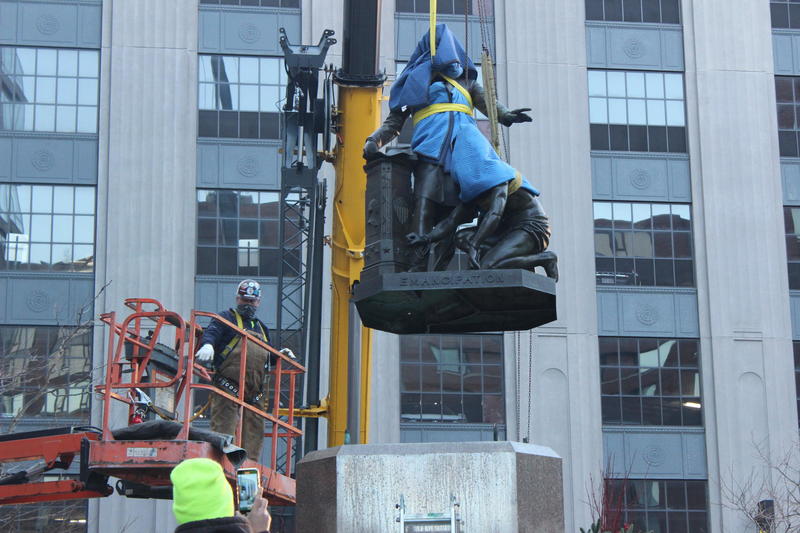A look back at 2020 for the Mayor’s Office of Arts and Culture
2020 was an extremely difficult year for Boston’s arts community as we faced significant setbacks caused by the COVID-19 pandemic and grappled with racial injustices across the country.
While many artists and organizations experienced financial losses and major changes to their practices and programming, Boston’s arts sector remained committed to helping us overcome this year’s challenges together. We’re grateful for the unique perspectives Boston’s artists have offered us this year, and their work to allow us to express ourselves creatively. We’re also very proud of the work the Mayor’s Office of Arts and Culture has done over the past year to support this community of creatives and enhance arts and culture throughout the entire city. Here’s a snapshot of some of the things we were able to accomplish:
Pivoting current programs and establishing new funds in response to COVID-19At the onset of the pandemic in Boston, we knew we needed to act fast to support local artists whose gigs and practices were impacted by the pandemic. We’re proud to be the first municipality to establish an Artist Relief Fund, where we were able to support over 600 artists through grants in partnership with Boston Center for the Arts. Later in the year, we also established a $1 million Arts and Culture COVID-19 Fund to better support arts organizations facing financial losses. Stay tuned for more information about an additional relief fund specifically for Boston’s BIPOC arts community.
We embarked on a three-year regranting program with MassArt that focuses on imagining a racially just future for Boston. For the pilot year, the RIRJ program received over 300 applications and made 16 grants to an intergenerational group of artists. The grantees will develop a wide variety of projects that work toward racial justice in the City of Boston this year, including audiovisual storytelling to examine anti-blackness in Latinx communities, a multimedia project in Chinatown involving youth, and a game design studio that supports young game designers of color, just to name a few.
This year started with us introducing Boston’s very first Youth Poet Laureate, Alondra Bobadilla. A student at Fenway High School, Alondra has played an integral role this year as we examine the intersections of art and mental health, as well as the role of youth in the city. The year continued to be an exciting one for Boston’s poetry community when our Poet Laureate Porsha Olayiwola was was one of 23 Poets Laureate across the country to be named a Fellow by the Academy of American Poets. She received a $50,000 grant to launch a new HOME Poetry Series, and will be leading a new Roxbury Poetry Festival later this year.
This past summer the Strand partnered with Brighter Boston to launch a teen employment program that offered employment and training in technical theater and event production to local youth. The six-week program culminated in a series of capstone projects, and allowed students to delve into the fields of lighting, audio, and stage management. In the fall of 2020, the Strand also partnered with DS4SI (Design Studio for Social Intervention) to project artwork by local musicians, dancers, and artists on the exterior of the building as part of their "Projecting Our Stories" initiative.
Through the Boston Artists-in-Residence (AIR) program, artists work with a parallel cohort of City partners to explore, critique, and re-imagine City initiatives at the intersection of civil service, social justice, and artistic practice. When we launched the fourth year of the program, our cohort of five artists had to quickly adapt their plans and projects due to restrictions on gatherings and holding public events. Despite these challenges, they have continued to find ways to engage communities and use their creative practices to advocate for changes in the city. We’ve seen them lead some great events, such as Golden’s citywide Trans and Non-Binary Town Hall, and Erin Genia’s Confronting Colonial Myths discussion series, and we look forward to collaborating with them even more this year.
We have been convening organizations and stakeholders invested in the well-being of our local teaching artist community over the past few years. We established the Boston Area Network of Teaching Artists (BANTA) Facebook group as a way for local teaching artists to network, share resources and opportunities such as professional development workshops and jobs, and come together as a community with shared needs and experiences.
We had several big public art updates this year, including commissioning artists for long-term projects throughout the city such as Destiny Palmer’s project at BCYF Vine Street in Roxbury. Matthew Hinçman’s long-term project at the Jamaica Plain Branch and BCYF Curtis Hall began installation, and we’re looking forward to seeing it completed this spring. 24 short-term public art projects were also awarded grants totaling $35,000 through our Transformative Public Art Program. Two murals that were funded by the program in 2019, Victor "Marka27" Quiñonez’s “Back to the Essence” and Rob “Problak” Gibbs’ “Breathe Life 2”, were completed this past summer in Newmarket Square and Roxbury.
As we worked to address racism as a public health crisis in the city, we recognized a need to evaluate the role and impact of our public art collection. Through public meetings held by the Boston Art Commission, we began a public engagement process to assess the historical and cultural significance of our collection and the harm done to people through racist imagery and symbolism. In the past year, the Boston Art Commission voted unanimously to initiate a process to study the future of the Christopher Columbus statue. The City ultimately reached an agreement with the Knights of Columbus to let the statue live permanently in their development at 41 Margin Street. The Mayor's Office of Arts and Culture and the Boston Art Commission also began a public engagement process over the summer that led to the decision to remove and relocate the Emancipation Group statue. Over the course of two public hearings that allowed hundreds of residents to express their feelings, and after taking into account the petition from local artist Tory Bullock that gained more than 12,000 signatures to remove the statue, the statue was taken down at the end of the year and will remain in storage until a new location has been identified.
As we begin a new year, we look forward to more investments in public art across all of our neighborhoods, launching a new collections database that will serve as an educational tool for anyone interested in learning more about local artwork, continuing to support local artists in sharing their work and partnering with local arts organizations to allow for even more opportunities for creative expression across the city. We hope you’ll join us in elevating arts and culture in Boston in 2021. Happy New Year!

